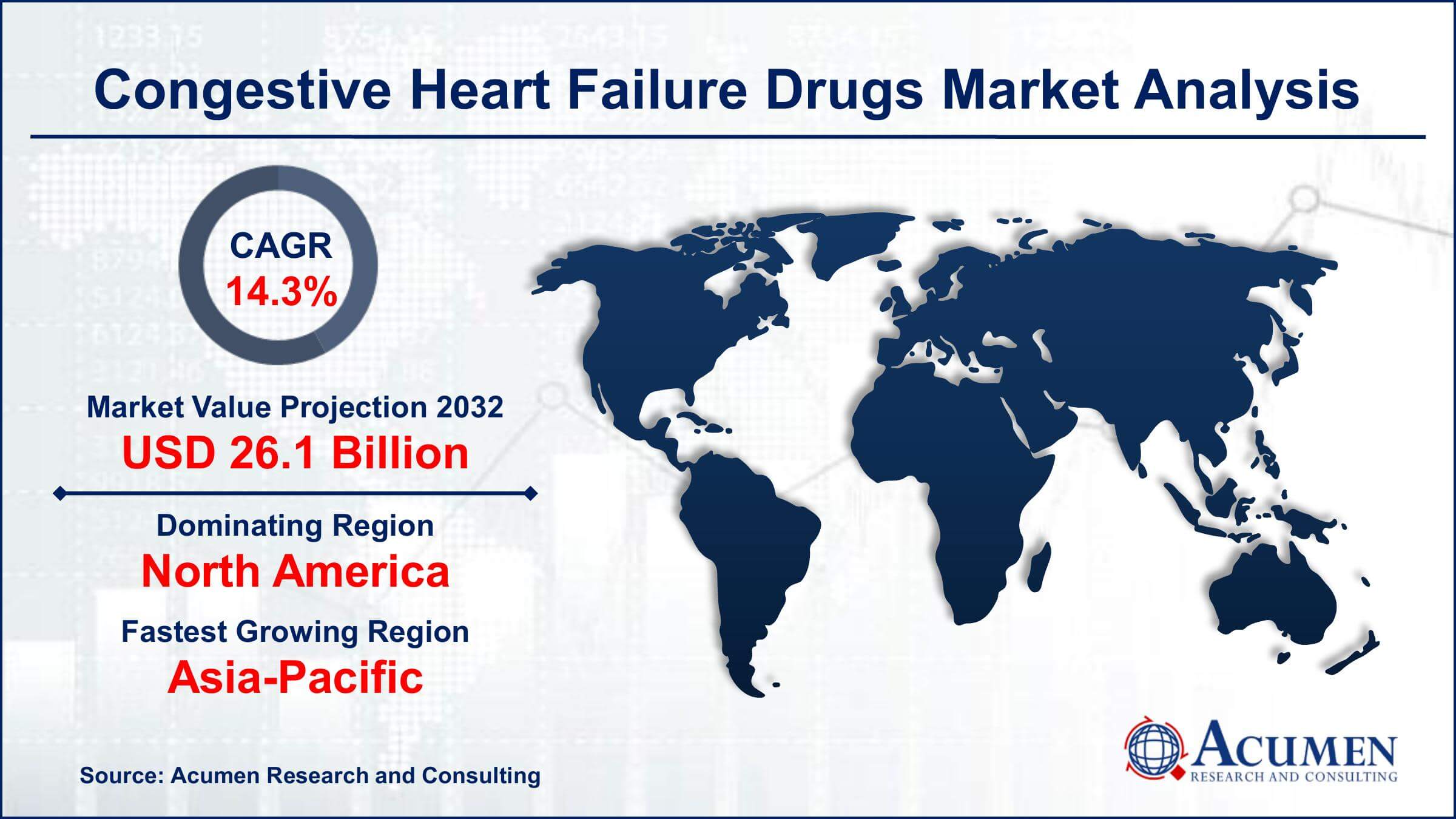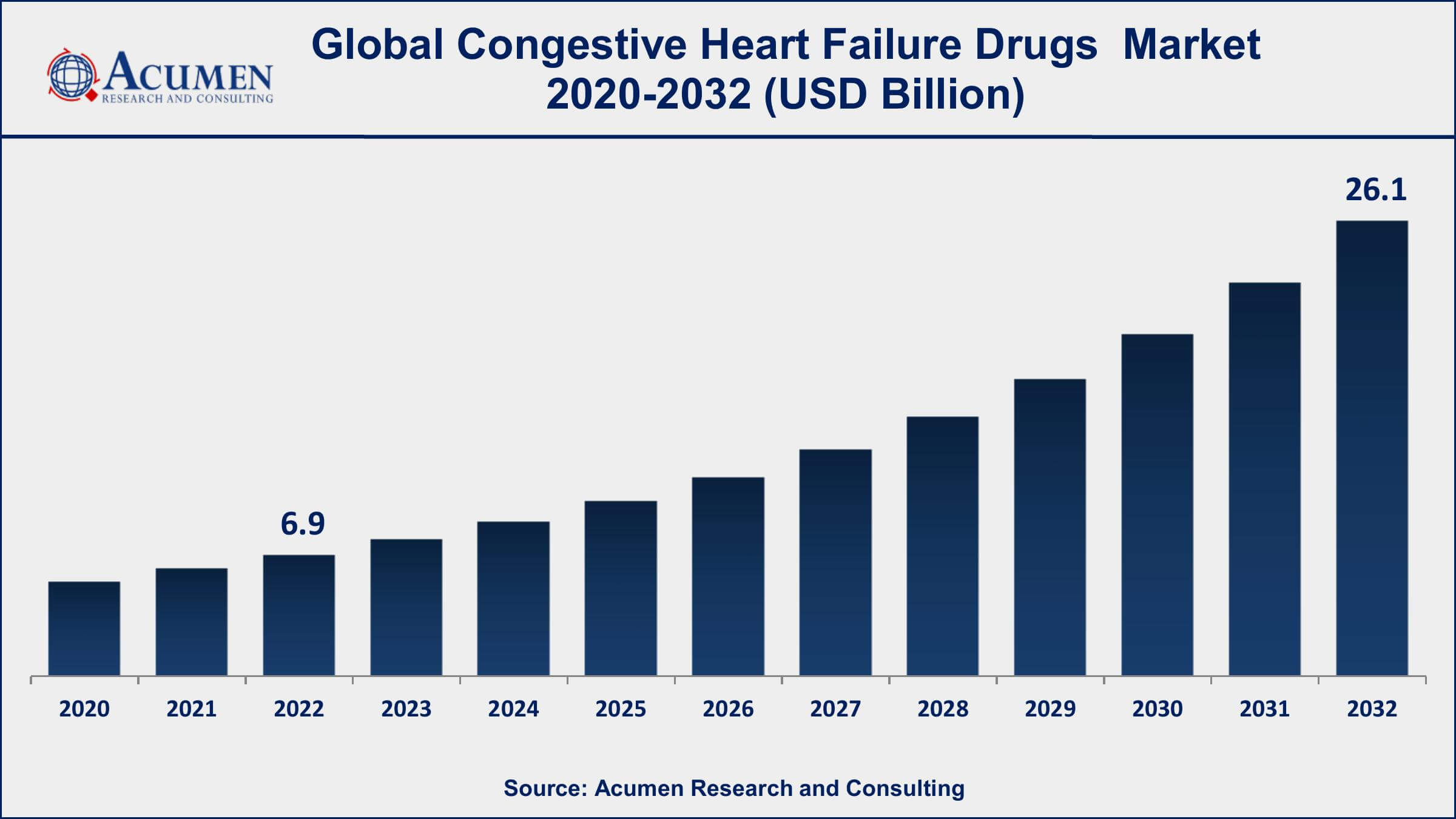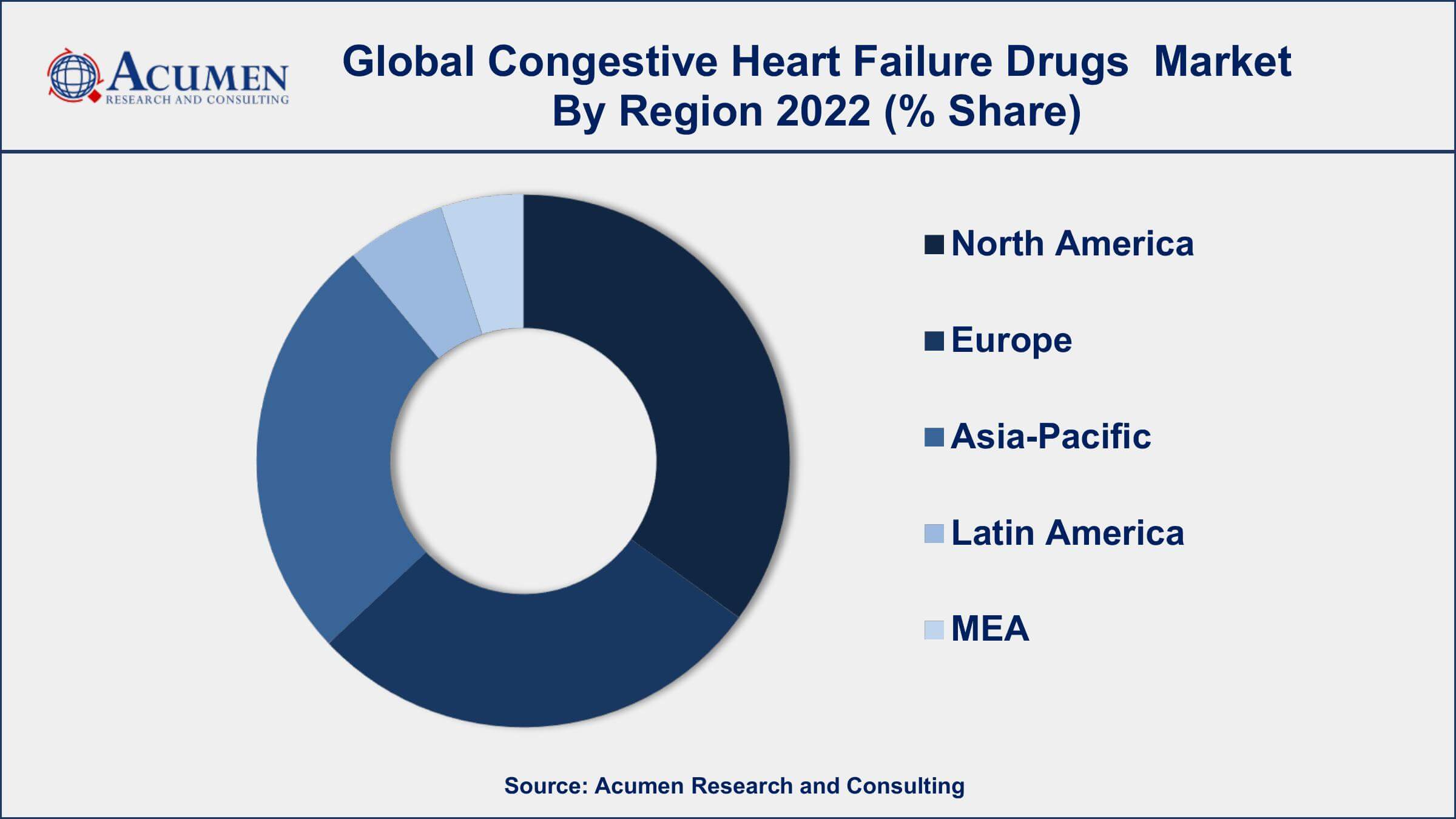Congestive Heart Failure Drugs Market Size - Global Industry, Share, Analysis, Trends and Forecast 2023 - 2032
Published :
Report ID:
Pages :
Format :
Congestive Heart Failure Drugs Market Size - Global Industry, Share, Analysis, Trends and Forecast 2023 - 2032
Report Coverage
- Industry Dynamics
- Market Size and Forecast Data
- Segment Analysis
- Competitive Landscape
- Regional Analysis with a Niche Focus on Country-Level Data
- High Level Analysis - Porter's, PESTEL, Value Chain, etc.
- Company Profiles of Key Players
- Option to Customize the Report As Per Your Specific Need
Request Sample Report
The Global Congestive Heart Failure Drugs Market Size accounted for USD 6.9 Billion in 2022 and is projected to achieve a market size of USD 26.1 Billion by 2032 growing at a CAGR of 14.3% from 2023 to 2032.
Congestive Heart Failure Drugs Market Highlights
- Global Congestive Heart Failure Drugs Market revenue is expected to increase by USD 26.1 Billion by 2032, with a 14.3% CAGR from 2023 to 2032
- North America region led with more than 34% of Congestive Heart Failure Drugs Market share in 2022
- Asia-Pacific Congestive Heart Failure Drugs Market growth will record a CAGR of around 15.1% from 2023 to 2032
- By drug class, the ACE inhibitors is the largest segment of the market, accounting for over 29% of the global market share
- By distribution channel, the hospital pharmacies is one of the largest and fastest-growing segments of the congestive heart failure drugs industry
- Growing incidence of cardiovascular diseases, drives the Congestive Heart Failure Drugs Market value

Congestive Heart Failure (CHF) drugs are medications designed to manage and alleviate the symptoms of congestive heart failure, a chronic medical condition characterized by the heart's inability to pump blood effectively, leading to fluid buildup in the lungs and other body tissues. These drugs serve various purposes in the treatment of CHF, such as improving cardiac function, reducing fluid retention, and enhancing the patient's overall quality of life. Common categories of CHF drugs include angiotensin-converting enzyme (ACE) inhibitors, beta-blockers, diuretics, aldosterone antagonists, and vasodilators. The combination of these medications is often tailored to the individual patient's condition, aiming to reduce the workload on the heart, manage blood pressure, and control fluid retention.
The market for congestive heart failure drugs has witnessed steady growth over the years due to several factors. The aging population, coupled with the increasing prevalence of chronic heart conditions, has driven demand for CHF medications. Additionally, advancements in pharmaceutical research have led to the development of more effective and targeted drugs, improving treatment outcomes for CHF patients. Furthermore, the rise in awareness about heart health and the availability of various treatment options have contributed to the expansion of this market. As healthcare systems continue to evolve and emphasize the importance of cardiovascular health, it is expected that the congestive heart failure drugs market will continue to grow, offering better solutions for patients with this challenging condition.

Global Congestive Heart Failure Drugs Market Trends
Market Drivers
- Increasing prevalence of CHF due to an aging demographic
- Advances in drug development and delivery systems
- Growing incidence of cardiovascular diseases
- Enhanced screening and early detection methods
- Unhealthy lifestyles leading to heart conditions
Market Restraints
- High treatment costs of CHF drugs and therapies
- Potential adverse effects of CHF medications
Market Opportunities
- Innovative drug candidates in the pipeline
- Increased focus on heart health education
Congestive Heart Failure Drugs Market Report Coverage
| Market | Congestive Heart Failure Drugs Market |
| Congestive Heart Failure Drugs Market Size 2022 | USD 6.9 Billion |
| Congestive Heart Failure Drugs Market Forecast 2032 | USD 26.1 Billion |
| Congestive Heart Failure Drugs Market CAGR During 2023 - 2032 | 14.3% |
| Congestive Heart Failure Drugs Market Analysis Period | 2020 - 2032 |
| Congestive Heart Failure Drugs Market Base Year |
2022 |
| Congestive Heart Failure Drugs Market Forecast Data | 2023 - 2032 |
| Segments Covered | By Drug Class, By Distribution Channel, And By Geography |
| Regional Scope | North America, Europe, Asia Pacific, Latin America, and Middle East & Africa |
| Key Companies Profiled | Novartis, Amgen, AstraZeneca, Bristol-Myers Squibb, Johnson & Johnson, Pfizer, Merck & Co., Mylan, Boehringer Ingelheim, Teva Pharmaceutical Industries, GlaxoSmithKline (GSK), and Eli Lilly and Company |
| Report Coverage |
Market Trends, Drivers, Restraints, Competitive Analysis, Player Profiling, Covid-19 Analysis, Regulation Analysis |
Congestive Heart Failure (CHF) drugs are a category of pharmaceuticals developed to manage and treat the symptoms of congestive heart failure, a chronic condition in which the heart is unable to effectively pump blood throughout the body. CHF results in the accumulation of fluid in the lungs and other body tissues, causing symptoms such as shortness of breath, fatigue, and swelling in the extremities. These drugs play a crucial role in improving the quality of life for individuals living with CHF by alleviating symptoms, slowing disease progression, and reducing the risk of hospitalization.
The application of CHF drugs is multifaceted and aims to address various aspects of the condition. Key applications include the enhancement of cardiac function, regulation of blood pressure, reduction of fluid retention (edema), and the management of underlying causes such as hypertension and coronary artery disease. Common drug classes used in CHF treatment include angiotensin-converting enzyme (ACE) inhibitors, beta-blockers, diuretics, aldosterone antagonists, and vasodilators. By targeting these different mechanisms, CHF drugs work together to ease the heart's workload, improve blood flow, and reduce fluid buildup, ultimately helping patients better manage their condition and enjoy a higher quality of life.
The congestive heart failure (CHF) drugs market has been experiencing steady growth driven by several key factors. One of the primary drivers is the increasing prevalence of cardiovascular diseases, particularly among the aging population. As the global population continues to age, the incidence of CHF is rising, creating a growing demand for medications that can help manage the condition and improve patients' quality of life. This demographic shift has led to a substantial market for CHF drugs, which is expected to continue expanding. Technological advancements in drug development and delivery systems have also played a crucial role in driving market growth. Pharmaceutical companies are continually innovating to create more effective and targeted CHF medications, enhancing treatment outcomes and reducing side effects. Additionally, there is a growing emphasis on early diagnosis and intervention, which is further fueling the demand for CHF drugs.
Congestive Heart Failure Drugs Market Segmentation
The global Congestive Heart Failure Drugs Market segmentation is based on drug class, distribution channel, and geography.
Congestive Heart Failure Drugs Market By Drug Class
- ACE Inhibitors
- Beta Blockers
- Angiotensin 2 Receptor Blockers
- Diuretics
- Inotropes
- Aldosterone Antagonists
- Others
In terms of drug classes, the ACE inhibitors segment accounted for the largest market share in 2022. ACE inhibitors, or Angiotensin-Converting Enzyme inhibitors, have been a cornerstone in the treatment of CHF for several years. These medications work by dilating blood vessels, reducing the heart's workload, and improving cardiac function. As a result, they help alleviate symptoms such as fluid retention and shortness of breath, improving the overall quality of life for CHF patients. One significant driver of the growth in the ACE inhibitors segment is the increasing prevalence of CHF, which has prompted higher prescription rates of these drugs. As the aging population grows, so does the number of individuals at risk of heart-related issues, driving the demand for effective CHF treatments like ACE inhibitors. Additionally, clinical research and trials have consistently demonstrated the benefits of ACE inhibitors in reducing mortality and hospitalizations among CHF patients, further solidifying their role in the standard of care.
Congestive Heart Failure Drugs Market By Distribution Channel
- Hospital Pharmacies
- Online Pharmacies
- Retail Pharmacies
According to the congestive heart failure drugs market forecast, the hospital pharmacies segment is expected to witness significant growth in the coming years. Hospital pharmacies play a pivotal role in the management and treatment of CHF patients, as these facilities are often the primary point of care for acute cases and the initiation of CHF drug regimens. One of the primary drivers of growth in the hospital pharmacies segment is the increasing prevalence of CHF. As the global population ages and lifestyle factors contribute to the rise in heart-related diseases, there is a growing demand for specialized cardiac care. Hospital pharmacies are well-equipped to provide immediate access to CHF medications and ensure timely administration to patients in critical conditions. This has led to increased prescription rates and a greater volume of CHF drugs dispensed through hospital pharmacies. Furthermore, advancements in cardiac care and the emergence of new and more effective CHF medications have also fueled growth in this segment.
Congestive Heart Failure Drugs Market Regional Outlook
North America
- U.S.
- Canada
Europe
- U.K.
- Germany
- France
- Spain
- Rest of Europe
Asia-Pacific
- India
- Japan
- China
- Australia
- South Korea
- Rest of Asia-Pacific
Latin America
- Brazil
- Mexico
- Rest of Latin America
The Middle East & Africa
- South Africa
- GCC Countries
- Rest of the Middle East & Africa (ME&A)

Congestive Heart Failure Drugs Market Regional Analysis
North America has emerged as a dominating region in the congestive heart failure (CHF) drugs market for several compelling reasons. Firstly, the prevalence of cardiovascular diseases, including congestive heart failure, is relatively high in North America. Lifestyle factors such as poor diet, sedentary behavior, and an aging population contribute to the increased incidence of CHF in the region. The United States, in particular, has a significant number of CHF patients, which drives the demand for CHF drugs. Moreover, the well-established healthcare infrastructure in North America, including advanced medical facilities and a high level of healthcare spending, ensures that CHF patients have access to the latest medications and treatments. Moreover, North America has a robust pharmaceutical industry that continuously invests in research and development. This industry innovation leads to the development of new and more effective CHF drugs, which are readily available to patients in the region. Regulatory agencies in North America, such as the U.S. Food and Drug Administration (FDA), have stringent but well-defined approval processes that ensure the safety and efficacy of new drugs, instilling confidence in both healthcare providers and patients.
Congestive Heart Failure Drugs Market Player
Some of the top congestive heart failure drugs market companies offered in the professional report include Novartis, Amgen, AstraZeneca, Bristol-Myers Squibb, Johnson & Johnson, Pfizer, Merck & Co., Mylan, Boehringer Ingelheim, Teva Pharmaceutical Industries, GlaxoSmithKline (GSK), and Eli Lilly and Company.
Frequently Asked Questions
What was the market size of the global congestive heart failure drugs in 2022?
The market size of congestive heart failure drugs was USD 6.9 Billion in 2022.
What is the CAGR of the global congestive heart failure drugs market from 2023 to 2032?
The CAGR of congestive heart failure drugs is 14.3% during the analysis period of 2023 to 2032.
Which are the key players in the congestive heart failure drugs market?
The key players operating in the global market are including Novartis, Amgen, AstraZeneca, Bristol-Myers Squibb, Johnson & Johnson, Pfizer, Merck & Co., Mylan, Boehringer Ingelheim, Teva Pharmaceutical Industries, GlaxoSmithKline (GSK), and Eli Lilly and Company.
Which region dominated the global congestive heart failure drugs market share?
North America held the dominating position in congestive heart failure drugs industry during the analysis period of 2023 to 2032.
Which region registered fastest CAGR from 2023 to 2032?
Asia-Pacific region exhibited fastest growing CAGR for market of congestive heart failure drugs during the analysis period of 2023 to 2032.
What are the current trends and dynamics in the global congestive heart failure drugs industry?
The current trends and dynamics in the congestive heart failure drugs market growth include increasing prevalence of CHF due to an aging demographic, advances in drug development and delivery systems, and growing incidence of cardiovascular diseases.
Which drug class held the maximum share in 2022?
The ACE inhibitors drug class held the maximum share of the congestive heart failure drugs industry.


